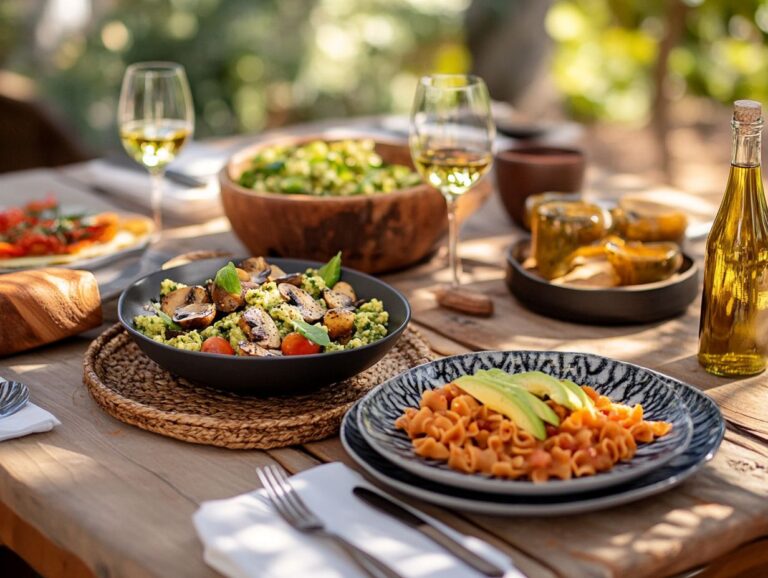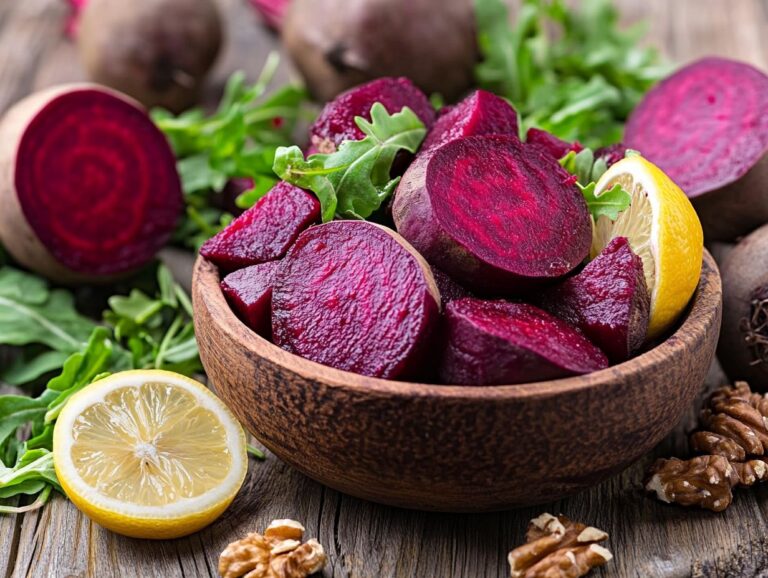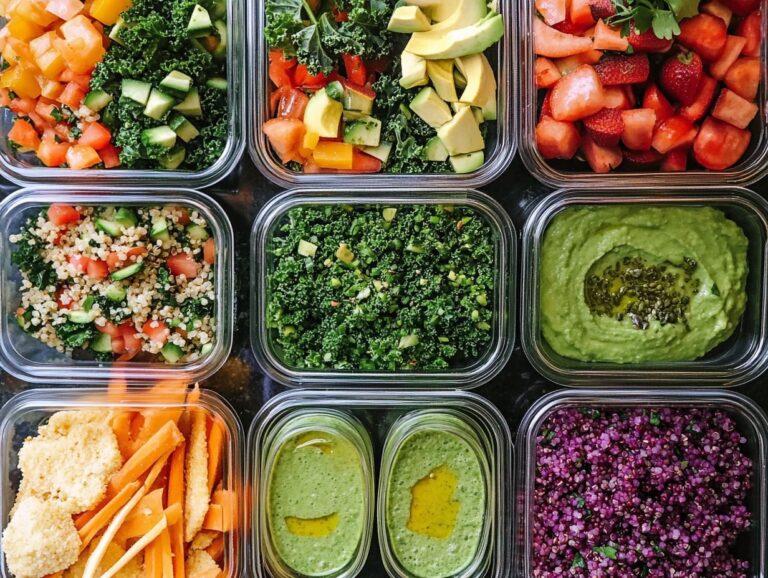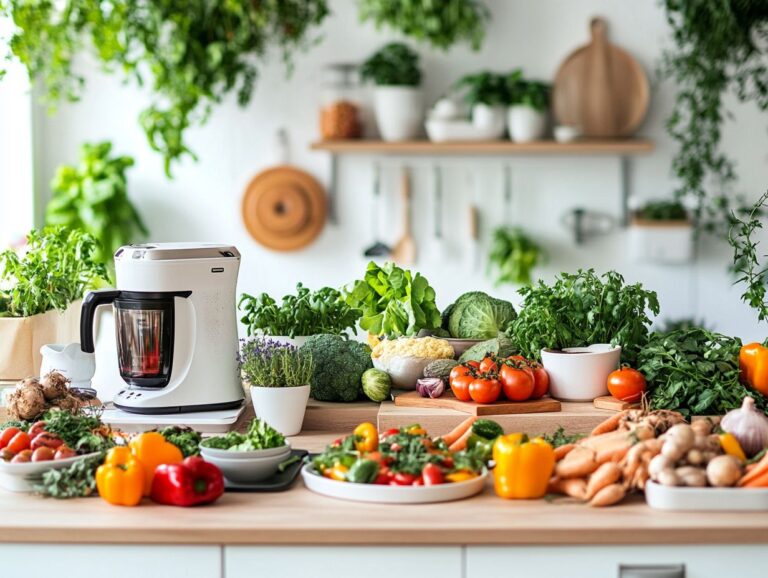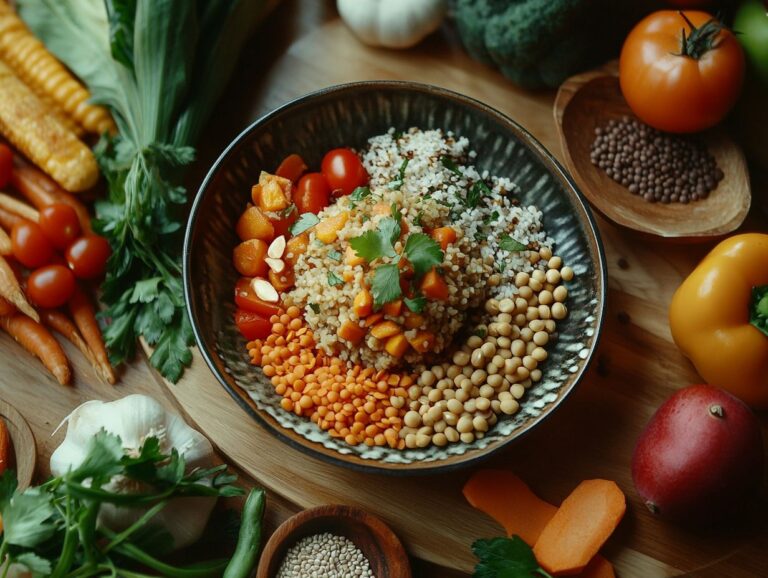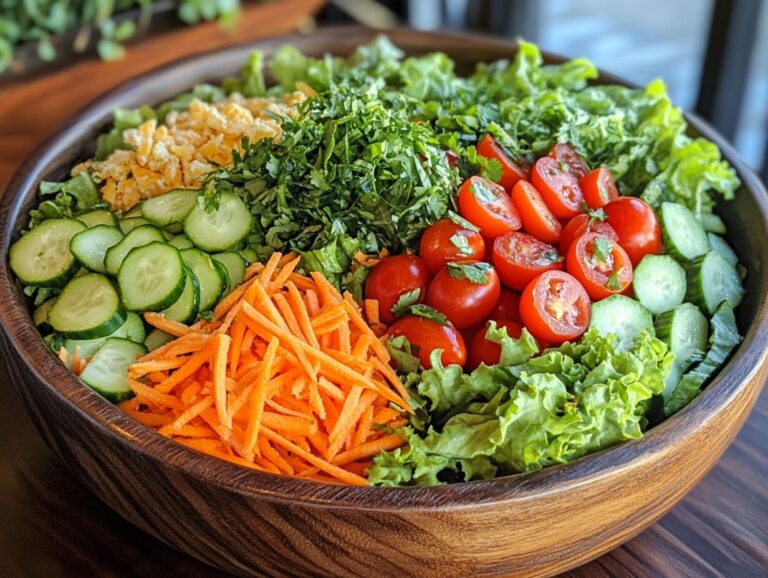It is possible to build muscle on a vegan diet. Vegan bodybuilding combines plant-based nutrition with strength training to achieve impressive results. This article explores the essential nutrients necessary for muscle building, the best vegan protein sources, and a sample meal plan to help you stay fueled. Additionally, it offers tips for overcoming challenges faced by vegan bodybuilders, along with high-protein recipes.
What is Vegan Bodybuilding?
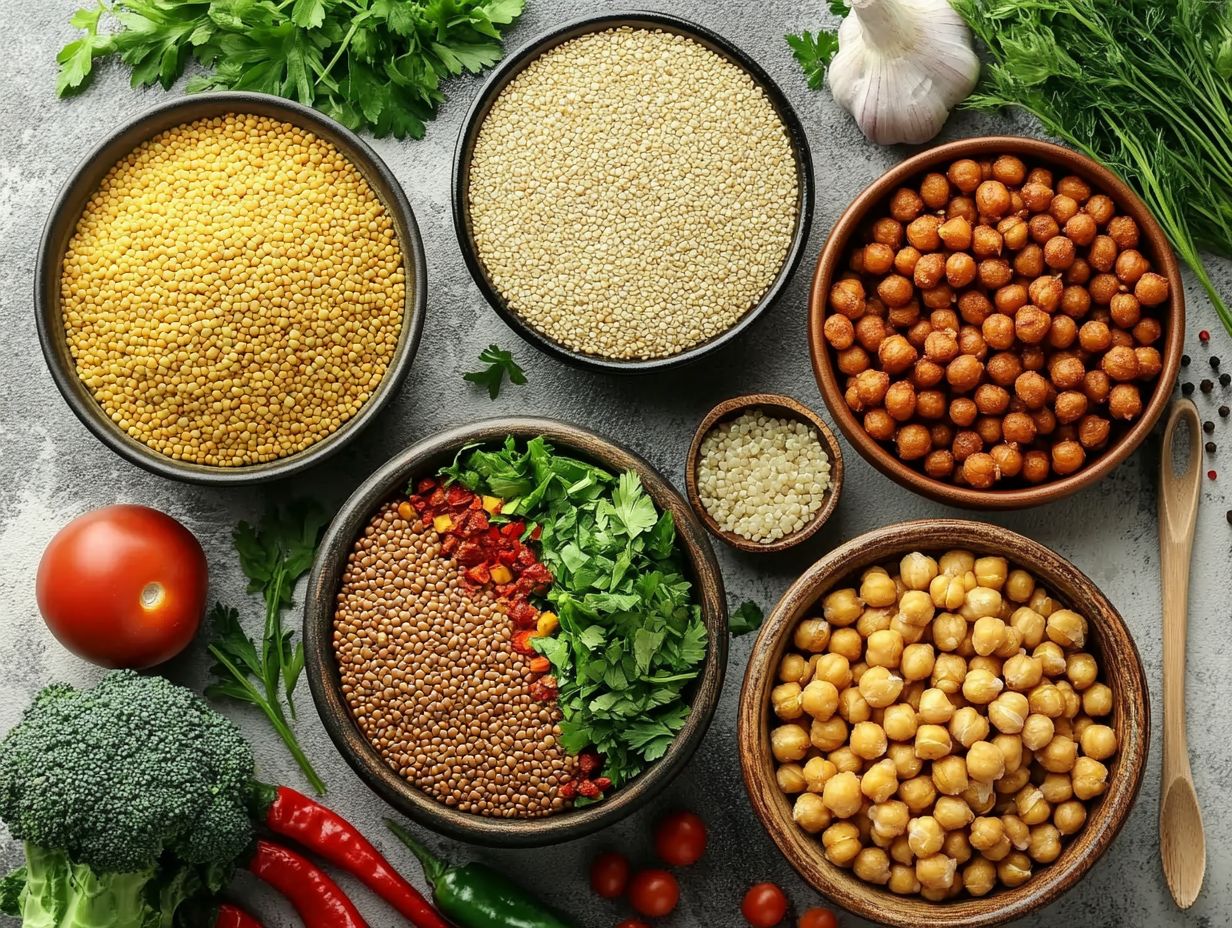
Vegan bodybuilding is a specialized approach to bodybuilding that utilizes plant-based nutrition to promote muscle growth and enhance athletic performance. This method combines the fundamental principles of bodybuilding with the ethical and health benefits associated with a vegan lifestyle, emphasizing nutrient-dense foods that help individuals achieve their fitness goals.
Transitioning to a vegan diet not only aids in muscle recovery but also encourages sustainable eating habits and provides essential vitamins and minerals without relying on animal products. This culinary shift also supports muscle hypertrophy and optimal energy levels, which are critical for resistance training and workout recovery.
As more athletes adopt a vegan diet, they discover effective protein sources and meal plans that support their fitness objectives. The rising popularity of vegan bodybuilding suggests a trend toward more conscious living, where individuals prioritize not only their physical gains but also their overall health and the well-being of the environment.
For instance, athletes can meet their protein requirements by incorporating:
- Legumes
- Quinoa
- Tofu
into their diets, while enjoying a rich and varied selection of foods that are high in antioxidants and fiber. This approach can lead to increased energy levels, reduced inflammation, and improved digestive health, all of which enable individuals to train harder and recover more quickly.
The main principles of vegan bodybuilding focus on balancing macronutrients, ensuring adequate calorie intake, and maintaining a diverse range of vitamins and minerals, all achievable through whole foods. This makes vegan bodybuilding a viable path for fitness enthusiasts who choose a plant-based lifestyle.
The Importance of Nutrition for Muscle Growth
Nutrition plays a crucial role in muscle growth, and vegan diets must be carefully planned to ensure adequate protein intake and sufficient calories to support strength training and recovery.
Nutrient-dense foods provide the energy necessary for maintaining muscle definition as well as the reserves required for strength training and daily energy levels. Incorporating a variety of food combinations can enhance the nutrient profile of meals, supporting both muscle growth and performance.
Additionally, meal preparation and proper meal timing are essential components for achieving fitness goals, as they enable athletes to adhere to their diets and optimize their performance.
Key Nutrients for Muscle Building
Key nutrients essential for bodybuilding and muscle development on a vegan diet support muscle growth, strength training, and recovery. These include plant-based proteins, essential nutrients, and micronutrients that contribute to muscle repair and overall fitness.
These nutrients include protein, which is vital for synthesizing new muscle tissue, as well as various vitamins and minerals that assist the body’s biological functions.
Protein plays a crucial role in building muscle and strength, as the body uses proteins (amino acids) to repair tissues, produce enzymes and hormones, and bolster the immune system. Plant protein sources such as legumes, tofu, and tempeh are excellent for meeting protein content requirements and supporting vegan athletes in their training regimen.
Vegan bodybuilders often rely on sources such as beans, lentils, nuts, seeds, grains, nutritional yeast, and soy products like tofu and tempeh.
Different types of protein contain varying amounts of amino acids, making it important to maintain a diverse diet. When proteins are consumed, they are broken down into amino acids, which are then utilized to build new tissue, including muscle. However, since plant foods generally contain lower protein levels than animal sources, it can be challenging for vegan bodybuilders to meet their daily protein requirements without the assistance of protein supplements.
Plant-based protein powders can be an effective solution, as noted by sports dietitian and nutritionist Dr. Kelly Pritchett, who emphasizes their role in helping vegans fulfill their protein needs.
In addition to protein, other important nutrients for muscle building on a vegan diet include omega-3 fatty acids, which help reduce inflammation and facilitate quicker recovery after workouts, as well as antioxidants (such as vitamins A, C, and E) that enhance endurance and overall performance. Incorporating a variety of whole grains, healthy fats, and plant-based protein shakes can aid in meeting the dietary restrictions of vegan bodybuilders.
Omega-3 fatty acids are abundant in flaxseeds and chia seeds, while antioxidants are plentiful in a variety of fruits and vegetables, particularly berries and leafy greens. Furthermore, iron, calcium, and vitamin B12 are crucial micronutrients that support the overall health and performance of bodybuilders, regardless of their specific diets. Including energy-dense meals and vegan snacks, along with careful meal prep, can ensure that these micronutrient needs are met.
Vegan Protein Sources for Bodybuilding
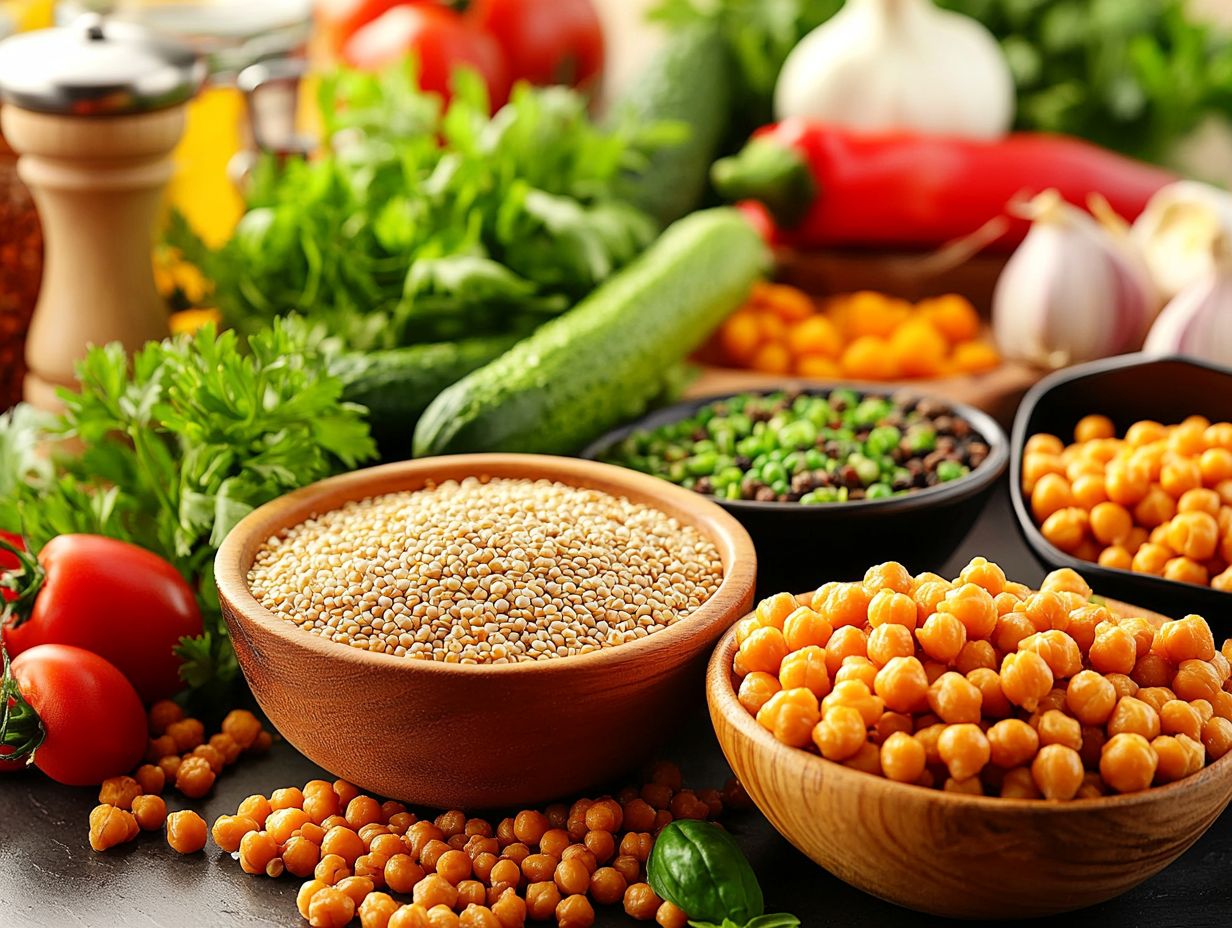
Identifying suitable vegan protein sources is essential for bodybuilders who aim to optimize their muscle development and performance. Effective food sources include vegetable protein options like quinoa and nutritional yeast, offering diverse protein-rich foods that cater to varied dietary preferences.
Plant-based proteins, including tofu, tempeh, legumes, nuts, and seeds, can be incorporated into a variety of meals and snacks. These protein sources also contribute to a balanced diet that encompasses healthy fats and carbohydrates.
Understanding how to combine these foods effectively can significantly enhance protein intake and improve fitness results. Incorporating recipes for athletes that focus on meal diversity and nutrient timing can optimize workout nutrition and support fitness goals.
Plant-based Proteins for Muscle Growth
Plant-based proteins are crucial for muscle growth in vegan bodybuilders, providing a full spectrum of amino acids necessary for optimal recovery and strength training. Foods such as lentils, quinoa, and peas are not only rich in protein but also offer dietary fiber and other essential nutrients that enhance overall health.
By incorporating these protein-rich foods into their diets, athletes can meet their protein needs while benefiting from a plant-based diet, which is associated with improved energy levels and better digestion. Each of these protein sources has a unique amino acid profile that can significantly influence performance and recovery.
For instance, quinoa is a complete protein that contains all nine essential amino acids, aiding in muscle tissue repair. Lentils are also high in protein and packed with B vitamins, which are vital for energy production.
To easily incorporate these nutritional powerhouses into daily meals, one can try the following:
- Make a delicious soup using lentils as the base.
- Add quinoa and vegetables to a stir-fry.
- Create a smoothie with pea protein powder.
These healthy recipes not only make it simple for athletes to meet their nutritional requirements but also promote optimal fitness performance.
Sample Vegan Bodybuilding Meal Plan
A sample vegan bodybuilding meal plan can be beneficial for athletes looking to structure their diets for optimal muscle growth and performance. This plan should focus on healthy meals and vegan snacks that include superfoods and low-fat recipes, along with strategic meal frequency to ensure a caloric surplus and adequate protein intake.
Such a meal plan should incorporate a balanced mix of protein sources, including quinoa, tofu, and legumes, as well as healthy fats and complex carbohydrates to meet calorie intake requirements. Incorporating vegan protein bars and nutrient-dense foods can further enhance the macro and micronutrient balance, supporting muscle mass and fat loss.
It is important to include nutrient-dense foods in the meal plan while also focusing on meal timing, as this can enhance recovery and energy levels, ultimately helping bodybuilders achieve their fitness goals. Exploring vegan meal ideas and recipe ideas can add meal variety and culinary skills to the fitness journey.
Additionally, meal preparation can aid in maintaining consistency in dietary habits and tracking macronutrients effectively.
Balanced Meals for Optimal Muscle Growth
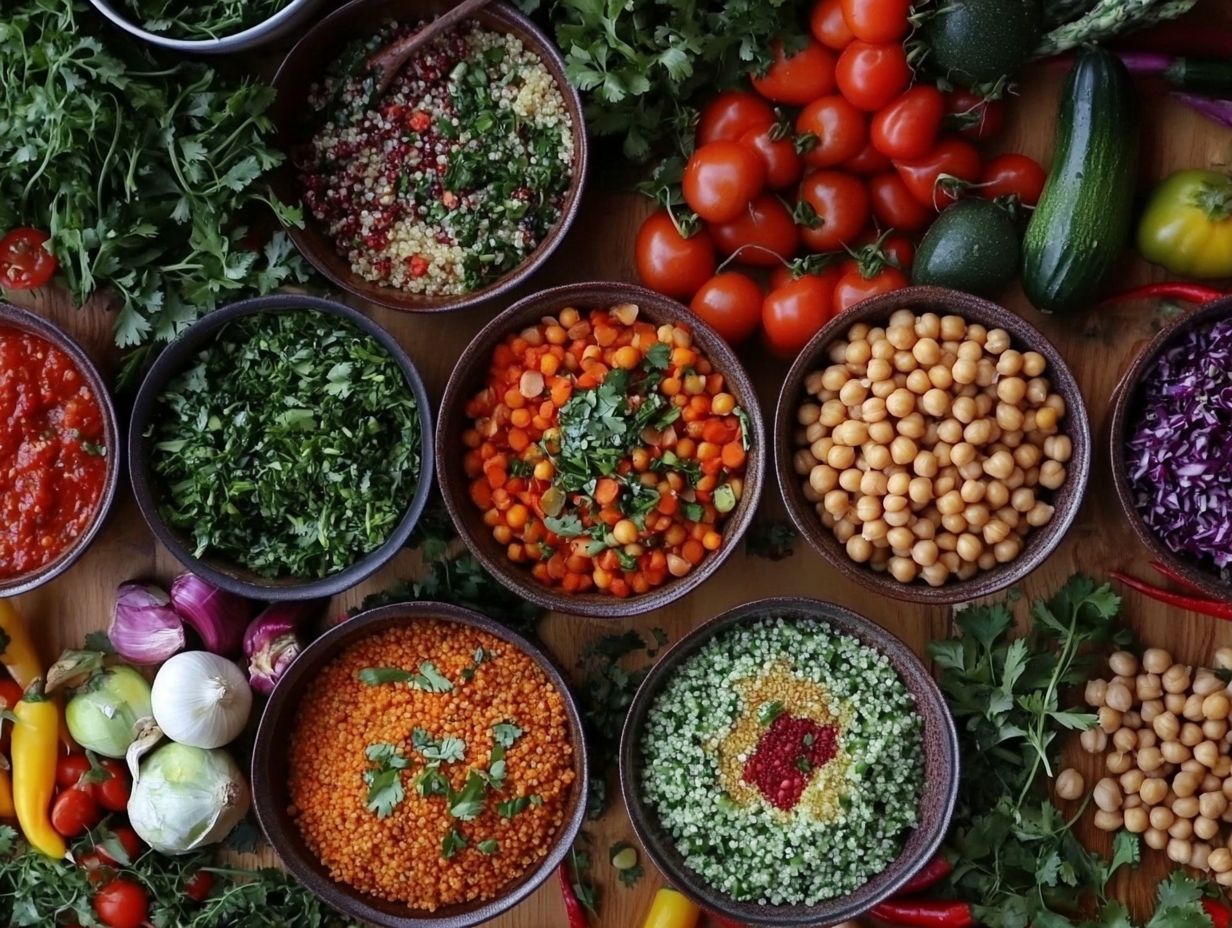
Balanced meals are crucial for optimal muscle growth, especially for those following a vegan diet. Emphasizing vegan cooking techniques and understanding the nutrient profile of various plant-based foods contribute to effective muscle building and weight lifting.
An ideal balanced meal should include a combination of protein-rich foods, carbohydrates for energy, and healthy fats to support overall health.
The aim is to explore a variety of food combinations and flavor profiles to ensure that meals are both delicious and nutritious for vegan bodybuilders. For instance, incorporating nuts, seeds, and whole grains can enhance the nutritional value of a meal.
It is also important to pay attention to timing and portion sizes, as these factors can significantly affect performance and recovery. Including balanced meals with high iron-rich foods, such as spinach or kale, can ensure that dietary needs are met while supporting muscle repair and fitness outcomes.
Meals that are high in lentils or chickpeas serve as excellent sources of plant protein, while quinoa provides protein along with a complete amino acid profile.
Additionally, including a variety of vegetables, such as spinach or kale, which are rich in vitamins and minerals, helps achieve the right macronutrient ratios. A macronutrient ratio of approximately 40% carbohydrates, 30% protein, and 30% fats is optimal for muscle-building, ensuring that nutrient intake adequately supports the demands of rigorous training and recovery.
Vegan Supplements for Bodybuilding
Vegan supplements play a crucial role in bodybuilding by enhancing performance and recovery for athletes adhering to a plant-based diet. These include branched-chain amino acids and protein shakes that complement vegan meals and optimize training regimens.
Supplements such as plant-based protein powders, creatine, and branched-chain amino acids (BCAAs) help address nutritional gaps and support muscle recovery after intense workouts.
By strategically incorporating these supplements alongside a balanced diet, vegan bodybuilders can optimize their training regimens and ensure they meet their protein and other nutrient requirements. This approach, coupled with proper hydration, can significantly impact muscle growth and recovery.
Performance and Recovery Enhancement
Improvement and recovery are fundamental goals in bodybuilding, and they are significantly influenced by nutrition. Incorporating energy-dense meals and focusing on vegan food prep can effectively support these goals, allowing for better adherence to a vegan bodybuilding diet.
For vegan athletes, post-exercise meals that are rich in plant-based proteins and carbohydrates play a crucial role in muscle recovery and energy replenishment.
Proper hydration and nutrient timing can optimize workout results, ultimately leading to enhanced strength and muscle development over time. Emphasizing healthy eating and exploring vegan cuisine can create balanced diets that meet the demands of intense bodybuilding recipes.
A well-balanced vegan diet offers numerous benefits, including a high concentration of antioxidants and anti-inflammatory properties that are essential for recovery.
Key protein sources, such as lentils, beans, nuts, tofu, and quinoa, are vital for meeting recovery needs, especially in the hours following intense exercise. Additionally, incorporating nutrient-rich snacks that are high in carbohydrates and electrolytes is important for effective rehydration and maintaining energy levels.
Ensuring the proper timing of these meals can enhance nutrient absorption and facilitate muscle recovery and energy restoration, thereby creating a cycle of continuous improvement and performance enhancement. This emphasizes the importance of meal timing in a bodybuilder’s training regimen.
Vegan Bodybuilding Recipes
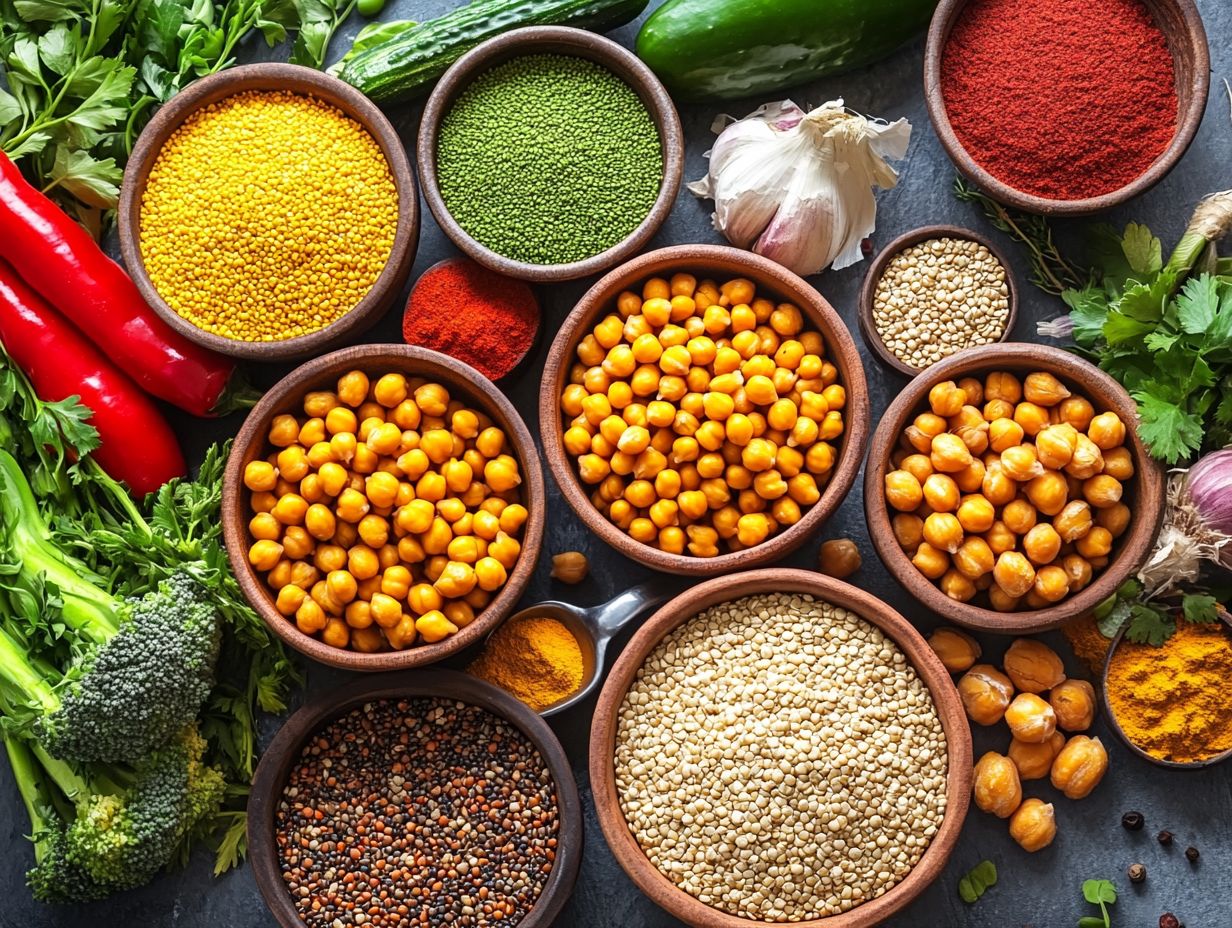
Vegan bodybuilding recipes play a crucial role in ensuring that an athlete’s diet is both energizing and enjoyable, providing the necessary taste and texture to make meals satisfying. These protein-rich foods are key to muscle growth and recovery.
Meals rich in plant-based protein and composed of various plant-based ingredients can supply the essential nutrients required for optimal performance, muscle building, and recovery.
By exploring different cooking methods and flavors, athletes can create a diverse array of meal options tailored to their taste preferences, making it easier to adhere to a vegan diet while successfully pursuing their fitness goals. Vegan cooking not only supports dietary restrictions but also enhances culinary skills.
High-Protein Meal Ideas
High-protein meal ideas are essential for vegan bodybuilders to ensure they receive adequate protein for muscle building. Meals that feature lentils, chickpeas, quinoa, and tempeh, along with other plant protein sources, are excellent options, as they can be easily prepared in bulk for meal prep. Protein from these sources can be combined with a variety of vegetables and grains to create wholesome meals that are both calorie-sufficient and enjoyable to eat. This approach not only helps athletes develop their cooking skills but also enhances their dining experience with nutrient-dense foods.
Here are a few high-protein meal ideas:
- Chickpea and Quinoa Salad: Combine cooked chickpeas and quinoa with diced cucumbers, tomatoes, and red onion. This dish, rich in vegetable protein and dietary fiber, can be served on its own or accompanied by oven-roasted vegetables such as carrots, zucchini, and asparagus for a satisfying lunch.
- Lentil and Vegetable Stew: Prepare a hearty stew by cooking lentils with diced carrots, celery, and tomatoes in vegetable broth. This dish is an excellent source of plant-based protein and can be made in large batches and frozen for convenient reheating.
- Tempeh Stir-Fry: Slice tempeh and stir-fry it with bell peppers, broccoli, and snap peas. Serve this colorful mix with brown rice or whole grain noodles for a protein-rich and energy-dense meal.
To avoid monotony in meal prep, consider batch cooking and storing meals in airtight containers. This strategy helps maintain meal variety while reducing cooking time throughout the week, supporting a balanced diet.
Tips for Building Muscle on a Vegan Diet
Building muscle on a vegan diet can be challenging, but proper meal planning can help you overcome these difficulties. Here are some important strategies to consider when trying to build muscle on a vegan diet, ensuring your nutrition supports muscle hypertrophy and repair:
- High Protein Intake: Consume a wide variety of plant-based foods, such as legumes, to ensure you receive adequate nutrition, particularly in protein, supporting muscle mass and growth.
- Macro Ratios: Ensure that your macronutrient ratios align with your fitness goals and accommodate dietary restrictions.
- Meal Prep: Meal prepping is essential for maintaining consistency in your diet and achieving caloric surplus when needed.
- Nutritional Supplements: Consider taking nutritional supplements, like vegan protein shakes, to fill any gaps in your diet and boost protein content.
- Food Combinations: Be mindful of food combinations to enhance both flavor and nutrient absorption, ensuring a well-rounded nutrient profile.
Maximizing Results and Overcoming Challenges
Maximizing results in vegan bodybuilding requires strategic planning to overcome challenges associated with a plant-based diet. Nutrient timing is essential, ensuring that meals are well-balanced around workouts to support energy levels and facilitate muscle recovery, which is key to achieving optimal performance. Effective workout nutrition can enhance muscle repair and growth.
By addressing common challenges, such as meeting protein requirements and managing calorie intake, athletes can remain committed to their fitness goals while reaping the benefits of a vegan lifestyle. Incorporating high-protein recipes into your meal plans can significantly aid in achieving desired results.
One significant challenge faced by vegans is the misconception that plant-based proteins are of lower quality than meat-based proteins. However, incorporating a variety of protein-rich sources like lentils, chickpeas, quinoa, tempeh, and hemp seeds can easily fulfill the necessary protein intake, supporting overall fitness and muscle growth.
Additionally, careful tracking of micronutrient intake is crucial, as insufficient levels of iron, calcium, or vitamin B12 can hinder progress. Utilizing fortified foods or appropriate vegan supplements can be vital for enhancing performance and recovery, helping athletes stay motivated and active in their workouts. Iron-rich foods and balanced meals can also support healthy eating and muscle hypertrophy.
